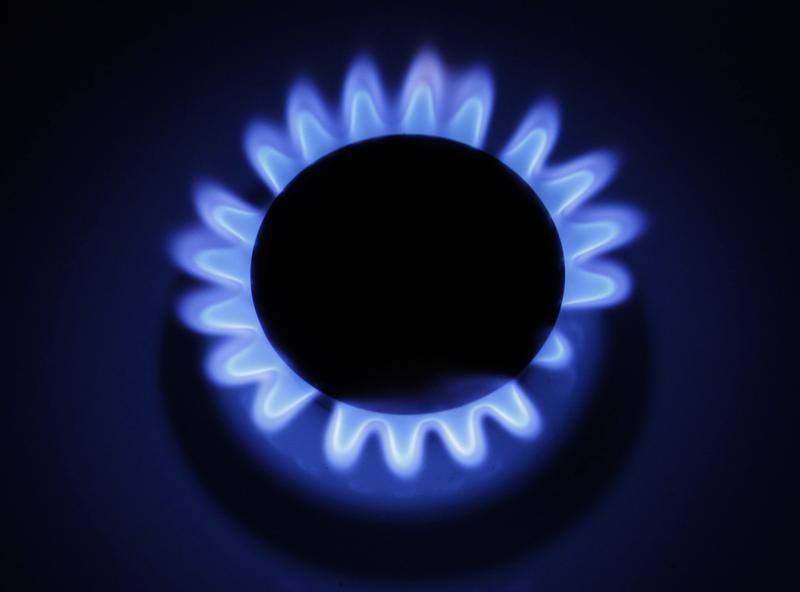Investing.com – US broke new ground with $3 pricing on Thursday, hitting nine-month highs after data showing a smaller-than-expected storage build last week in America’s favorite fuel for indoor heating and cooling.
The most-active November gas contract on the New York Mercantile Exchange’s Henry Hub hovered at $3.15 per mmBtu, or million metric British thermal units, by 11:37 ET (15:37 GMT). Earlier in the day, November gas peaked at $3.16, the highest for a Henry Hub front-month since $4.39 in January.
“It looks like $3 gas pricing is here to stay,” John Kilduff, partner at New York energy hedge fund Again Capital, said, commenting on the run-up.
Wednesday’s rally in gas came after the US Energy (NASDAQ:) Information Administration, or EIA, reported a build of just 86 billion cubic feet, or bcf, in storage of the fuel during the week to Sept. 29, versus the 94 bcf expected by industry analysts tracked by Investing.com. In the prior week to Sept. 22, storage rose by 90 bcf.
The smaller-than-expected build was likely caused by higher power burns by utilities last week as some lingering warmth before the advent of cooler fall temperatures led to more air-conditioning demand.
Total gas in US storage was at 3.088 trillion cubic feet as of last week, up 11.6% from a year ago, the EIA said. Earlier this year, the storage was more than 20% up year-on-year. On a five-year basis (2018-2022), inventories were just 5.3% higher, down from double-digits earlier this year.
Since their last foray into sub-$2 territory in April, gas futures have climbed some 65%, with weather, demand and production all coming together to support higher pricing.
But the ride higher has been a stormy one for gas bulls, who for the lack of a real major storm — snow or hurricane — were often caught in the throes of mid-$2 pricing. There wasn’t a lack of drama though, with sudden spikes in demand for liquefied natural gas, or LNG; unexpected pipeline outages or record production exceeding a 100 billion cubic feet, or bcf, a day, coloring the path. There was even a 24% gain for June — the best month for gas bulls since April 2022. Miraculously, through it all, $3 pricing kept evading the market most of the year.
After twice failing to hold to $3 pricing, gas bulls could be 3rd-time lucky
Before October, the $3 phenomenon only happened in March, when some late chill minus the typical frigidity of winter led to average heating demand that brought a peak of $3.03. Then in August, with record heat in Texas and other summer hotspots, hefty air-conditioning brought the market to $3.02.
Now, with the mid-fall season suggesting some deeper cold before the transition to winter, some analysts are postulating that the market may just hold on to $3 levels as the trade increasingly embraces production above 100 bcf a day as the new normal for America.
Some are also considering as negligible current storage overhang that’s 6% above five-year levels. To be sure, it was double-digits before.
Bloomberg, for instance, estimated that production held just above 100 bcf/d on Wednesday, on par with earlier in the week amid a spate of maintenance events in the Permian Basin. More importantly, output for October thus far has been more than 2 bcf/d below peak summer months.
Concurrently, trade journal naturalgasintel.com cited NatGasWeather as saying that forecasts have added several heating degree days, or HDDs, largely because of colder air projected to blow into the northeastern United States late this week, creating an early bout of demand for gas to power furnaces.
Some heating demand already emerged in the far northern reaches of the Rockies and Upper Midwest early this week after a chilly, rainy system moved into those regions, NatGasWeather said.
Even technical charts for gas indicate support for pricing in the higher $3 range, though some caveats apply, said Sunil Kumar Dixit, chief technical strategist at SKCharting.com.
“Stability above $2.93 acts as support for the current bullish wave that targets $3.18 and the 100 Month Simple Moving Average of $3.25, which is closely followed by the 50-week Exponential Moving Average of $3.33,” said Dixit.
“But a strong base above $3.25 would be needed for an extension of the bullish rebound towards the next leg up, marked by the 200-week SMA of $3.77.”
Read the full article here




